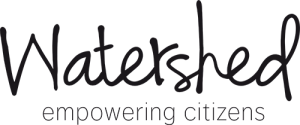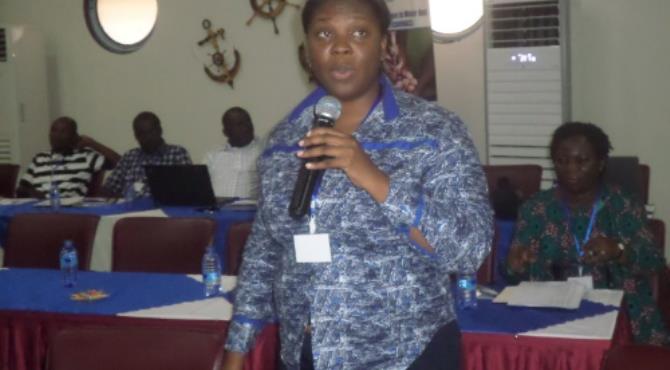Poor community attitudes, lack of improved infrastructure and wetlands being used as refuse dumps have resulted in ill-managed sanitation facilities and polluted water resources in the Ghanaian Tarkwa Nsuaem Municipal District. To improve the conditions in the district a coherent approach was required, yet government, CSOs and communities were long unable to shape joint solutions. Dedicated attention for collaboration and collective action within the Watershed Empowering Citizens Programme brought the much-needed change as stakeholders learned how to become partners and are now witnessing the first results of their aligned voices.
When the Watershed Empowering Citizens Programme kicked-off in 2016, the programme partners in Ghana soon realized they had to establish a collaborative partnership if they were to achieve results in Tarkwa Nsuaem. Programme partners IRC, Simavi, CONIWAS and HFFG were all focusing on solving similar issues but worked in silos. Veronica Ayi-Bonte, program manager of IRC Ghana, explains: “We were part of the same programme, but we weren’t coherent in terms of how we were voicing our issues to the government. As NGOs we often speak about collective action as a desirable concept, but there is a lot of competition.”
What followed was a phase of exploration, learning and alignment. Partners actively asked themselves “How can we productively work together?” and learned the collaboration required all of them to venture in new areas. Mercy Amokwandoh, project coordinator, HFFG recalls: “The programme created opportunity for all implementing CSOs to undertake organisational capacity self-assessment. Through this, HFFG outlined integration of WASH and water resources management as a weakness. Watershed then provided capacity building so we could understand Water Resources Management (WRTM) and how to do the integration with WASH.” Partners started also to join each other’s meetings and trainings, moved together into communities, mapped out joint activities, connected with journalists to amplify community voices, and streamlined their messaging to the government. This process strengthened confidence in the collaboration and formed a solid foundation for the advocacy activities the partners would implement as part of the Watershed programme.
Once the connections between the partners became stronger, they were able to more productively engage with government at the district and national level. Instead of confronting the government with issues, the Watershed partners took an approach of deliberation and dialogue. In Tarkwa District this for example resulted in the Municipal Chief Executive (MCE) committing additional budget for the repair of broken-down boreholes. At the national level, the Watershed partners took a joint stand at the Mole Conference, the most important annual WASH event in Ghana. Furthermore, CONIWAS – the Coalition of NGOs in Water and Sanitation – established a working relationship with the Parliamentary Select Committee on water, works and housing. Now, CONIWAS’ calls for safe and affordable drinking water and sufficient associated government budgets for WASH do not only have more weight but are also directed to the right platform.
Looking back at the Watershed programme, an important lesson emerges: when programme partners align their interests and leverage their expertise, they stand a greater change at creating impact with advocacy. Nana Ibrahim Iddris, sub Chief of Adieyie Mile 10.5 testifies: “The Watershed programme made it possible for us to meet the stakeholders face to face to discuss our water problems. The programme gave us so much education and information on water and sanitation and how to handle our water resources which helped to know what to do and say when we meet the government officials in the district. Since the project came here, the community’s health post was commissioned by the Assembly, and our water quality has improved because the Assembly constructed new and mechanised borehole with filtration plant to make the water wholesome for us.” For Veronica Ayi-Bonte the success is now easily summarized: “We needed to speak with one voice, we came up together and finally practiced the concept of collective action.”
The Watershed Empowering Citizens Programme 2016-2020 aims to build the capacity of civil society organisations (CSOs), at international level and in The Netherlands, for evidence-based lobbying and advocacy on Water, Sanitation and Hygiene (WASH) and Integrated Water Resource Management (IWRM) issues. The programme is funded by the Dutch Ministry of Foreign Affairs and implemented by IRC, Simavi, Wetlands International and Akvo. In Ghana, the programme is supported by local partners Hope For Future Generation, Conservation Foundation, Ghana Water Journalist Network and CONIWAS.
This article was written by EyeOpenerWorks

